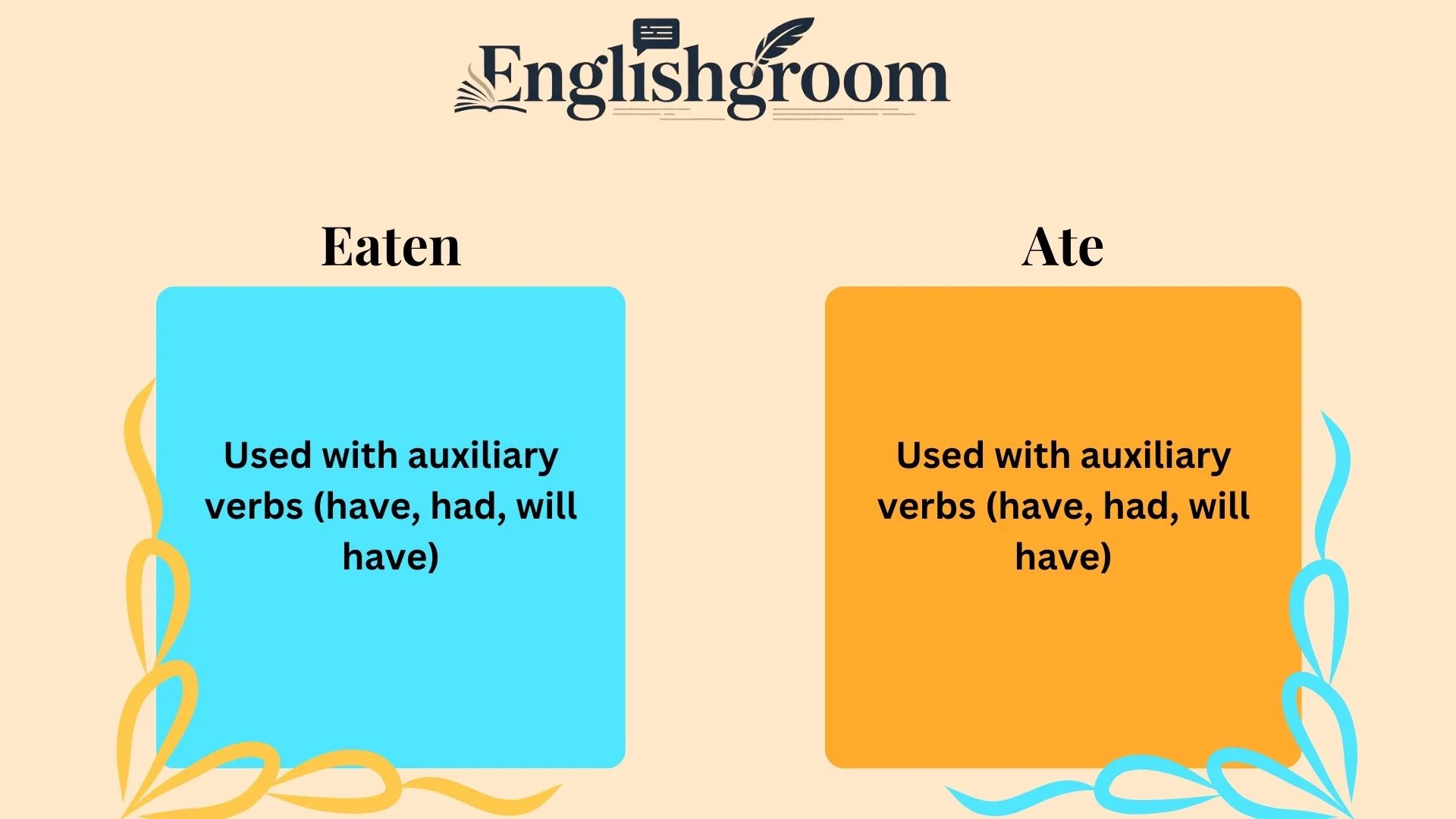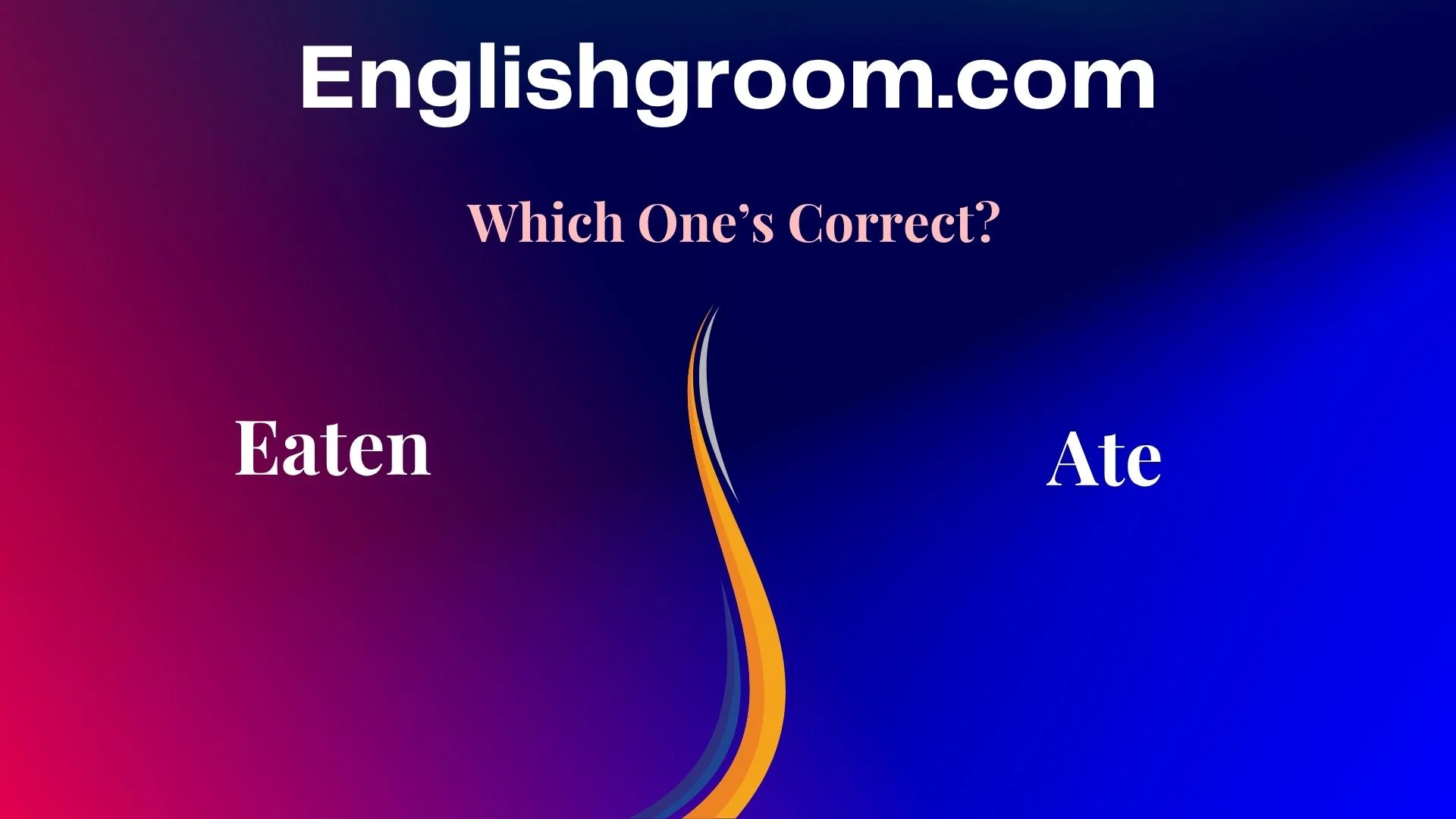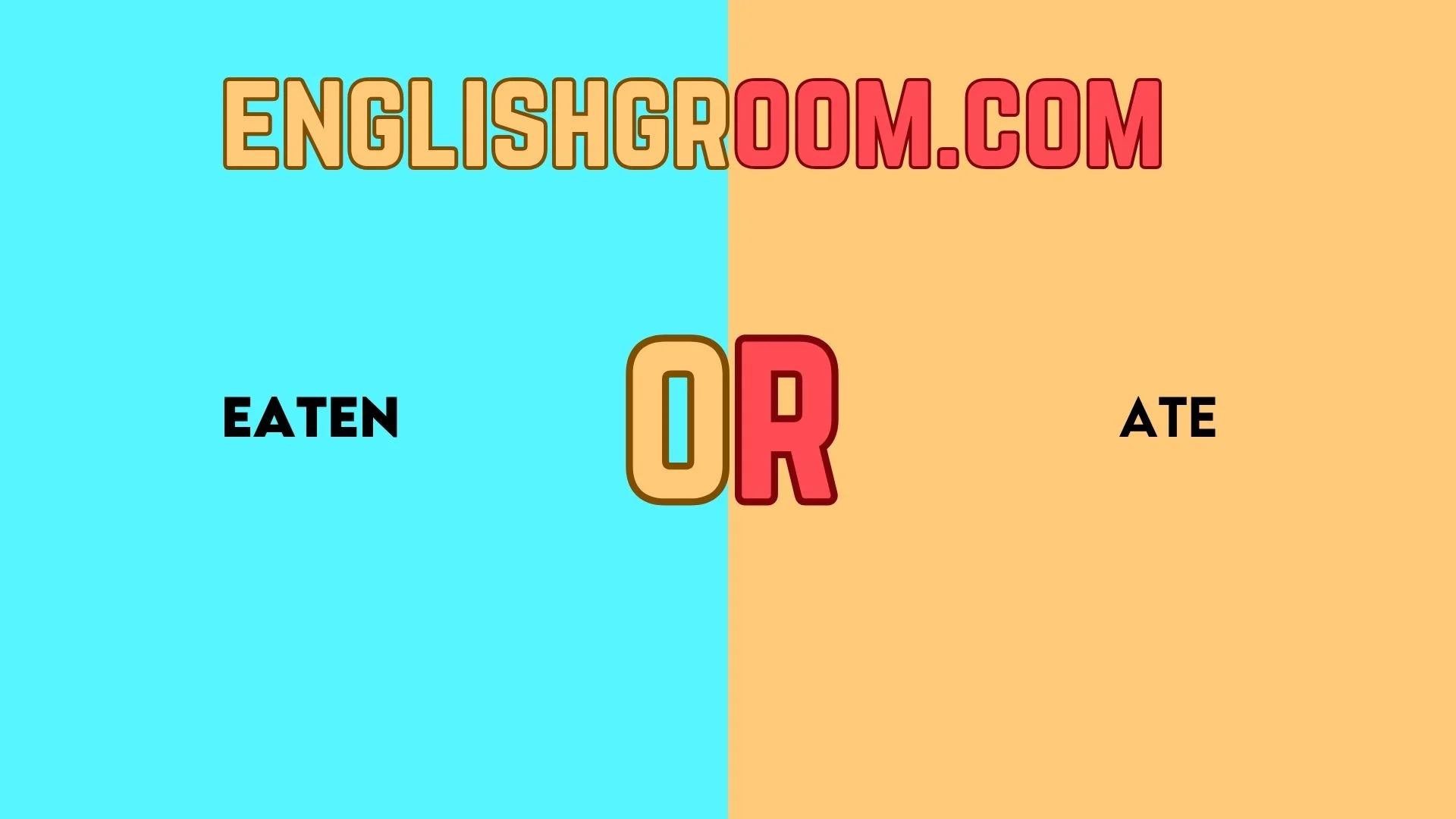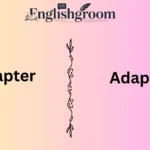Last updated on January 29th, 2026 at 08:43 am
Learning when to use “eaten” or “ate” can be tricky, even for fluent English speakers. Both words come from the same root verb — “eat” — yet they appear in very different grammatical situations.
If you’ve ever asked yourself, “Should I say ‘I ate’ or ‘I have eaten’?”, you’re in the right place.
By the end of this guide, you’ll know exactly when, why, and how to use each form naturally — just like a native speaker.
Why “Eaten” vs. “Ate” Confuses So Many People
You might think it’s just about memorization, but there’s a deeper reason English learners stumble here.
Both “ate” and “eaten” describe the action of consuming food — yet they belong to different verb tenses and different grammatical rules.
Here’s the short version:

| Word | Verb Form | Common Use | Example |
|---|---|---|---|
| Ate | Simple Past | Completed actions in the past | “I ate breakfast at 8 a.m.” |
| Eaten | Past Participle | Used with auxiliary verbs (have, had, will have) | “I have eaten already.” |
Let’s dig deeper into when each one fits naturally in conversation and writing.
Understanding the Root Verb “Eat” and Its Forms
English verbs often change their form depending on tense (when the action happens). “Eat” follows an irregular pattern, which means it doesn’t just add “-ed” like regular verbs.
| Base Form | Simple Past | Past Participle | Example |
|---|---|---|---|
| Eat | Ate | Eaten | “I eat,” “I ate,” “I have eaten” |
These three forms serve different purposes:
- Eat – Present tense (used now): “I eat breakfast every morning.”
- Ate – Past tense (completed action): “I ate pizza yesterday.”
- Eaten – Past participle (used with helping verbs): “I have eaten enough.”
Understanding this table is the key to mastering when to use eaten or ate correctly.
When to Use “Ate”: The Simple Past Tense
Use “ate” when describing something that happened and finished at a specific time in the past. It’s a complete action — no connection to the present.
✅ Examples
- I ate lunch at noon.
- She ate too much chocolate last night.
- We ate sushi yesterday.
These examples all include a definite time marker — yesterday, last night, at noon, etc.
You never use “have” or “had” with ate. That’s one of the most common mistakes learners make.
❌ Incorrect
- I have ate already.
- She had ate dinner before the show.
✅ Correct
- I have eaten already.
- She had eaten dinner before the show.
Tip: Signal Words That Indicate “Ate”
When you see or imply a specific past time, you’ll usually need ate:
- Yesterday
- Last week
- Two hours ago
- In 2020
- When I was a kid
When to Use “Eaten”: The Past Participle Form
“Eaten” is the past participle of “eat.”
It always requires an auxiliary (helping) verb like has, have, had, or will have.
You can’t use “eaten” alone.
✅ Correct Usage
- I have eaten breakfast.
- She had eaten before he arrived.
- They will have eaten by 8 p.m.
❌ Wrong Usage
- I eaten breakfast.
- She eaten before he arrived.
The word “eaten” connects the past action with another time or effect — in the present, past, or future — depending on the helping verb you use.
The Role of “Eaten” in Perfect Tenses
Let’s break down how “eaten” works inside the perfect tenses — a group of tenses that express completed actions connected to a specific time or condition.
Present Perfect: “Have/Has Eaten”
Use “have eaten” or “has eaten” when:
- The time of eating isn’t specific.
- The action has relevance to the present moment.
- You’re discussing life experiences or recent actions.
Examples
- I have eaten sushi before.
- She has eaten three times today.
- We have eaten already, so we’re not hungry.
Meaning: The action is completed, but the time isn’t important — what matters is the result now (you’re full, you’ve tried it, etc.).
Case Study:
Imagine you’re hosting friends for dinner. Someone offers you food, and you reply, “No thanks, I’ve already eaten.”
You’re not saying when you ate — just that you’ve already completed the action.
Past Perfect: “Had Eaten”
Use “had eaten” when describing an action that happened before another past action.
Examples
- She had eaten before he arrived.
- They had eaten lunch when the storm started.
- I had eaten too much, so I skipped dessert.
Timeline Visualization:
PAST ACTION 1 (Earlier) — She had eaten.
PAST ACTION 2 (Later) — He arrived.
The past perfect makes it clear which action happened first.
Future Perfect: “Will Have Eaten”
Use “will have eaten” for actions that will be completed before a future point in time.
Examples
- I will have eaten by the time you get here.
- They will have eaten dinner before the concert starts.
- She will have eaten all the snacks by tomorrow.
This form isn’t as common in everyday speech, but it’s crucial for clear, time-based descriptions in writing.
Using “Eaten” in Passive Voice
Another key role of “eaten” is in passive constructions — sentences where the action happens to the subject.
Active:
The children ate the cake.
Passive:
The cake was eaten by the children.
Rule:
Only past participles (like eaten, written, done, broken) appear in passive voice.
That’s why you never say “The cake was ate.”
Additional Examples
- The food was eaten by the guests.
- All the cookies have been eaten already.
- The pizza had been eaten before midnight.
Common Mistakes and Misuses
Even advanced speakers sometimes confuse these forms. Here are the most frequent mistakes and how to fix them.

| ❌ Incorrect | ✅ Correct | Explanation |
|---|---|---|
| I have ate already. | I have eaten already. | Eaten is the past participle needed with “have.” |
| She had ate dinner. | She had eaten dinner. | “Had” always pairs with “eaten.” |
| I eaten too much. | I ate too much. | No helping verb → use simple past “ate.” |
| The cake was ate. | The cake was eaten. | Passive requires past participle. |
Quick Fix Rule:
If there’s a helping verb (has, have, had, will have), use eaten.
If there isn’t, use ate.
Why “Have You Eaten?” is Correct
You’ve likely heard the phrase “Have you eaten?” — especially in everyday conversation. It’s correct because it uses the present perfect tense, which connects past action to the present moment.
- “Have you eaten?” → implies “Are you hungry now?”
- “Did you eat?” → refers strictly to a past time (perhaps earlier today).
Subtle Difference:
- Have you eaten? = still relevant now
- Did you eat? = past action only
Cultural Note:
In many English-speaking cultures, “Have you eaten?” can also serve as a polite greeting or concern for someone’s well-being — not just a literal question.
Quick Grammar Comparison Table
| Verb Form | Function | Example | Time Reference |
|---|---|---|---|
| Ate | Simple Past | I ate pizza last night. | Specific past time |
| Have/Has Eaten | Present Perfect | I’ve eaten pizza before. | Past action with present relevance |
| Had Eaten | Past Perfect | I had eaten before class. | Action before another past event |
| Will Have Eaten | Future Perfect | I’ll have eaten by 8 p.m. | Action before a future moment |
Practice: Spot the Error
Try identifying whether to use ate or eaten in these examples:
- She ___ breakfast before work.
- They have ___ already.
- By the time we arrive, he will have ___.
- The food was ___ quickly.
- I ___ dinner at 7 p.m.
Answers
- ate
- eaten
- eaten
- eaten
- ate
Writing Tip: Choose Natural Sound Over Strict Rules
Native speakers don’t consciously think about grammar rules — they rely on sound and context.
That’s why “I’ve eaten” feels right when the moment is still relevant, and “I ate” fits when you’re just recalling a past event.
Example:
- “I’ve eaten dinner.” → I’m full right now.
- “I ate dinner.” → Just a fact from earlier, no current connection.
Regional Note:
- British English often prefers “I’ve eaten already.”
- American English frequently says “I ate already.”
Both are acceptable, but context determines which fits best.
Summary and Quick Reference
Here’s a simple summary to lock it in:
- Use “ate” when talking about a specific, finished action in the past.
- Use “eaten” when there’s a helping verb or when describing an action connected to another time or effect.
Memory Trick:
“Use ate for when it happened. Use eaten for what’s done.”

FAQs About “Eaten” and “Ate”
What’s the difference between “I ate” and “I have eaten”?
“I ate” means the action happened at a specific past time. “I have eaten” connects the past action to the present, often implying you’re full or that it still matters now.
Can I say “I have ate”?
No. That’s incorrect. You must say “I have eaten.” The helping verb “have” requires the past participle form.
Why do people say “I ate already” instead of “I’ve eaten already”?
It’s more common in casual American English. Grammatically, “I’ve eaten already” is more formal and correct, but both are understood.
Can “eaten” ever stand alone without “have” or “had”?
No. “Eaten” always needs a helping verb (has, have, had, will have) or appears in a passive sentence like “The cake was eaten.”
Which is correct: “The food was ate” or “The food was eaten”?
Always “was eaten.” The word “eaten” fits passive constructions, while “ate” only works in active sentences.
Conclusion
Getting comfortable with “eaten” and “ate” isn’t about memorizing rules — it’s about understanding time and connection.
- “Ate” describes something you did — finished and done.
- “Eaten” links that action to another moment — the present, past, or future.
Keep practicing by reading, writing, and listening. Over time, you’ll naturally feel when each one fits.
As English teacher Rita Simmons once said:
“Grammar isn’t about perfection. It’s about clarity — saying exactly what you mean.”
So next time you’re about to write or speak, you won’t second-guess which word fits. You’ll just know.

Hi! I’m Sami, a 28-year-old content writer with a love for words and storytelling. Writing has always been my way of expressing ideas, sharing knowledge, and connecting with people. I enjoy creating engaging and well-researched content—whether it’s blogs, articles, or social media posts—that not only informs but also inspires readers. My goal is to turn complex ideas into clear, creative, and meaningful pieces of writing that leave a lasting impact.



